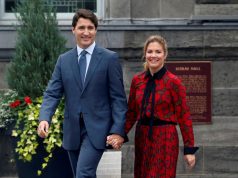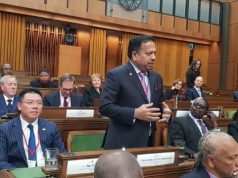 Montreal – The suspect in the shooting rampage at a Quebec City mosque which left six people dead and 19 others injured was Monday charged with six counts of first-degree murder and five counts of attempted murder, local police said.
Montreal – The suspect in the shooting rampage at a Quebec City mosque which left six people dead and 19 others injured was Monday charged with six counts of first-degree murder and five counts of attempted murder, local police said.
The 27-year-old suspect, identified as Alexandre Bissonnette (pic) appeared in a Quebec City court, Quebec police wrote on Twitter.
Bissonette’s Facebook profile, which has since been taken down, showed he studied anthropology and political science at Laval University.
Earlier, the provincial coroner identified the six victims, saying they were men of various walks of life – from a university professor to a halal butcher shop owner. They ranged in age from 39 to 60.
Police also released a second suspect they arrested shortly after responding to calls of multiple shots fired at the mosque in Quebec City’s Sainte-Foy neighbourhood.
“Surete du Quebec can confirm that only one of the suspects arrested in yesterday’s attack is now considered a suspect,” said a tweet from the Quebec Provincial Police, referring to its French name.
The second individual is now considered a witness, police said.
Bissonnette was arrested by a heavily armed police tactical unit about 20 kilometres from the scene of the shooting after he called the police and said he was ready to turn himself in, police said.
Police recovered firearms from the man’s car and a bomb squad was also called in to check for possible explosives.
Police have been tight-lipped on the possible motive for the attack at the Centre Culturel Islamique de Québec, which Prime Minister Justin Trudeau condemned as a terrorist attack.
However, police reassured Canadians that the situation was under control and they were confident no other suspects were involved in the attack.
Speaking in the House of Commons on Monday, Canadian Prime Minister Justin Trudeau promised to “get to the bottom of things.”
Officials avoided questions about whether rhetoric coming from the United States following President Donald Trump’s executive order suspending admissions from seven majority-Muslim countries played a role in the attack.
Once a bastion of Catholicism, but now proudly secular, Quebec has been embroiled in a bruising national identity debate that many in the province’s Muslim community felt was directed against them.
In an unsuccessful attempt to rally the nationalist vote in 2013, the previous separatist government proposed to adopt a “secular charter of Quebec values” that would have banned the wearing of “auspicious” religious symbols such as head scarves or face veils by public servants.
The move was seen by many as an indirect attack on the Muslim community and Muslim advocacy groups reported several incidents of harassment of Muslim women wearing head scarves.
Last June at the end of the holy month of Ramadan a pig’s head was left at the doorstep of the mosque that was targeted by the gunman.
Quebec Premier Philippe Couillard, who defeated the separatist Parti Quebecois in 2014, referred to the divisiveness when he called on all Quebecois to carefully weigh the impact of their words.
“The whole world is watching us. Together it’s time to show who we are, to show the best of ourselves: men and women who live together in French in this piece of North America that is Quebec,” he said.
-dpa










